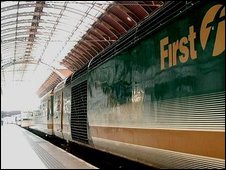£1bn plan to electrify rail line
 £1bn plan to electrify rail line
£1bn plan to electrify rail line A £1bn plan to electrify the main rail route between London and Swansea has been announced by the government.
A second line between Liverpool and Manchester will also be converted from diesel to electric.
Ministers say electric trains are lighter and more energy efficient, cutting the running cost and environmental impact of train services.
In the next eight years, overhead power lines will be installed and many tunnels and bridges will be demolished.
Upfront investment
Transport Secretary Lord Adonis told the BBC the massive investment involved would be worth it.
“With the electric trains you get a quieter, cleaner, more reliable and much cheaper train which benefits passengers and it also benefits the taxpayers because it’s much cheaper to keep an electric railway going,” he said.
“But you’ve got to put that upfront investment in. Governments historically have been very averse to making long-term investments.
“We’ve taken the decision that the right thing for the country is to have an electrified railway across the principal main lines and that’s why we’re going ahead with electrifying the Great Western Main Line.”
He said the investment would pay for itself over a 40-year period and that there would be no impact on fares.
Prime Minister Gordon Brown, at London’s Paddington station for the announcement, said improving the rail network was important for the country
“This is the future. It’s greener, it’s cleaner, it’s faster, it’s more reliable. It’s making the railways fit for the 21st Century and encouraging more passengers to use the railways,” he said.
Major benefits
The move means an electric version of the new Super Express intercity train unveiled last year will be introduced on the Great Western line.
The government and rail industry agree electrification will bring major benefits.
Electric trains do not carry their own fuel - weighing around six tonnes for a non-electric intercity train - and have lighter engines.
This makes them more than 35% cheaper to operate than diesel trains, according to the Department for Transport.
The electric engines also require less maintenance and the trains are around 20% cheaper to buy.
There are also major environmental benefits. The production of electricity for trains creates up to 35% less carbon than burning the equivalent amount of diesel.
Network Rail will carry out the work and has assured the government that lessons in the installation of overhead power lines have been learnt following a fiasco last year when work on the West Coast Main Line over-ran.
The company says it is buying specialist electrification trains capable of automating the installation job.
League table
The Campaign for Better Transport is concerned the investment will lead to an increase in fares but ministers say electrification will mean cost savings in the running of trains.
The Conservatives welcomed the move but questioned the cost to the taxpayer.
Shadow transport secretary Theresa Villiers said: “Yet again Labour are maxing out Network Rail’s credit card, leaving the taxpayer to foot the bill.
“After [Business Secretary] Lord Mandelson announced cuts to the transport budget, how can we believe that Labour can announce £1.1bn of new spending without impacting on existing transport commitments or putting further strain on public finances already stretched to breaking point?”
EUROPE’S ELECTRIC RAIL COVER
- Switzerland: 100%
- Sweden: 77%
- Netherlands: 73%
- Italy: 69%
- Germany: 56%
- Spain: 56%
- UK: 40% Source: UIC
Britain went through a period of electrification between the 50s and 80s in which two other main lines, the East and West, were converted.
Many commuter lines into London from the home counties are also electrified, using a third rail system rather than overhead cables.
But Britain still has proportionally less electric railway than most European countries and is below Macedonia in the league table.
The announcement means Wales will have its first stretch of electrified railway.
Between Manchester and Liverpool a smaller project to electrify the line via Newton-le-Willows has also been given the green light.
This will have the added benefit of allowing Transpennine trains between Manchester airport and Glasgow to run on electric power.
The government is still considering electrifying another major diesel route, the Midland Main Line between London and Sheffield, but has not committed the proposal.
Story from BBC NEWS:
You can return to the main Market News page, or press the Back button on your browser.

